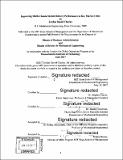Improving multi-channel retail delivery performance in key market cities
Author(s)
Charles, Jordan Daniel
DownloadFull printable version (9.927Mb)
Other Contributors
Leaders for Global Operations Program.
Advisor
Stephen Graves and Stanley Gershwin.
Terms of use
Metadata
Show full item recordAbstract
Digital retailers are currently experiencing explosive growth and mounting pressure from consumers to provide faster and cheaper delivery of product. This project develops two strategies to improve delivery speed, reliability, and cost for digital retailers operating in key North American markets (i.e. New York City, Los Angeles, and Chicago). Zone Skipping Transportation This project develops a zone skipping transportation model and associated business case for retailers with multiple consumer channels (i.e. digital and brick and mortar). Zone skipping pools digital and retail shipments, utilizing dedicated ground transportation of product from central distribution hubs to last-mile delivery hubs in key cities. For reasonable input parameters, zone skipping is shown to improve delivery speed by 20%, improve on-time delivery performance by 20%, and reduce costs by 10% over traditional carrier zone shipping. Multinodal Distribution (Ship-from-Store Simulation) Many multi-channel retailers employ multinodal distribution networks, but desire store fulfillment capabilities in key cities to improve key delivery metrics (speed and cost). To validate these capabilities, retailers can develop easily-tailorable analytical simulation models to test various hypotheses and distribution parameters. This project helps address two major ship-from-store questions: 1. What to Ship - A SKU stocking strategy that minimizes variability and ensures predictable and right-sized demand levels. The strategy needs to accurately predict future demand based on limited historical information. 2. How to Fulfill - The transformation of a store back room into a mini distribution center and all of the processes design to enable rapid fulfillment time given highly variable demand The SKU stocking strategy leverages advanced analytics, and the operational fulfillment processes are tested using simulation software that enables rapid manipulation of key variables to uncover optimal process flows. The resulting simulation model and SKU stocking framework can be leveraged by digital retailers to operationalize ship from store processes and accurately predict digital demand levels for future store fulfillment nodes.
Description
Thesis: M.B.A., Massachusetts Institute of Technology, Sloan School of Management, in conjunction with the Leaders for Global Operations Program at MIT, 2017. Thesis: S.M., Massachusetts Institute of Technology, Department of Mechanical Engineering, in conjunction with the Leaders for Global Operations Program at MIT, 2017. Cataloged from PDF version of thesis. Includes bibliographical references (page 95).
Date issued
2017Department
Leaders for Global Operations Program at MIT; Massachusetts Institute of Technology. Department of Mechanical Engineering; Sloan School of ManagementPublisher
Massachusetts Institute of Technology
Keywords
Sloan School of Management., Mechanical Engineering., Leaders for Global Operations Program.